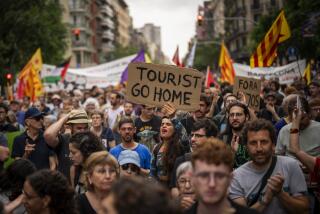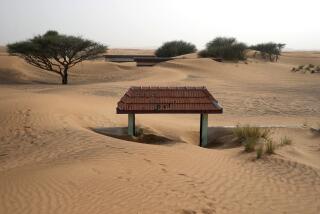Oman Is Tourists’ Dream--but It Doesn’t Want Any
- Share via
MUSCAT, Oman — Oman has all that tourists usually want--sandy beaches, palm trees wafting in tropical breezes, 16th-Century Portuguese forts, stark desert dunes, and even fiords like Norway’s.
But Oman doesn’t want tourists, not now anyway. Only special-interest groups like archeology or history clubs are welcome, but only after the government approves their applications.
Mohammed Ali Said, Oman’s director of tourism, explains why. “You can control groups but not individuals, and we don’t want to spoil our culture. . . . When people come in groups, you can brief them and guide them, while individuals cannot be controlled.”
“Tourists want more than sand and sun,” said Information Minister Abdul-Aziz bin Mohammed al-Rowas. “They want something else, and we’re not ready to provide the something else.”
Shunned Outside World
Although Oman has been using oil revenues for 16 years to bring itself up to date, its culture is based on old-time Arabia. It shut itself off from the outside world in the mid-19th Century and remained that way until 1970, when Sultan Qaboos bin Said al-Said led a coup against his father and began a crash modernization program.
According to Tourism Director Said, however, Oman still isn’t ready for the tourist in a bikini or other foreign styles and manners.
“In the capital area, you can see bikinis on the beaches and nobody bothers (the women wearing) them,” he said. “It’s not that way in the provinces.”
But as recession in Oman’s oil industry cuts sharply into the number of business visitors, the country’s fledgling hotel trade is being forced to pay a high price for the tourist curbs. In 1985, hotels had an average room occupancy rate of 58.5% and almost $69 million in sales, but occupancy this year is running at about 30%, Said explained in an interview. He added that 35% to 37% is needed for a hotel to break even.
Hotel Competition
Consequently, competition among hotels to fill their rooms became so intent that the government ordered them to stop undercutting each other and abide by official room rates or be shut down.
The country’s first hostelry, Muscat’s al-Falaj Hotel, was built a year after Qaboos took power. In the 15 years since, 2,077 rooms have been built, including a 132-room Holiday Inn, which opened in Muscat in November. Hotel executives say tourism would help them, but Said ruled out any change in government policy on tourists, at least for now.
“There’s no possibility of opening our country to individuals in the near future,” he said. “First of all, we’re not ready to receive a big quantity of tourists. . . . We don’t want people to come to see the capital only. There’s a lot to offer in the interior.”
He said foreign residents or business visitors are permitted to travel in the interior, along with citizens of neighboring Arab countries.
“They know how to act with our people, what is expected of them,” Said added.
To ensure that even they follow the rules, strategically placed signs warn them to dress properly or face stiff fines. In addition, a person can be fined $475 for driving on a beach or littering.
More to Read
Sign up for The Wild
We’ll help you find the best places to hike, bike and run, as well as the perfect silent spots for meditation and yoga.
You may occasionally receive promotional content from the Los Angeles Times.






